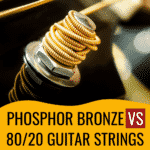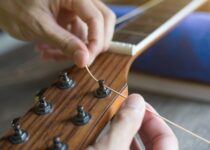The difference between phosphor bronze vs 80/20 guitar strings is in the alloys used, which affect the sound, durability, and feel. Phosphor bronze contains 92% copper, 8% tin, and small amounts of phosphorous. This combination gives it a balanced, warm-sounding tone and enhanced corrosion resistance. 80/20 strings contain 80% copper and 20% zinc, which gives them a punchy, bright tone.
Phosphor bronze and 80/20 strings are two of the most common types of acoustic guitar strings, and it can be difficult to choose between the two.
There is no one-size-fits-all answer to the question of which is better. It all depends on the tonal characteristics of your guitar, your style of playing, and the sound that you’re going for. You may find that the genre or style of playing plays an essential role in which string works best for you.
Each type of acoustic guitar string has their differences, and their pros and cons. The differences in material affect longevity, feel, and even the sound of 80/20 vs phosphor bronze guitar strings. In this post, we’ll take a loot at each will to help you decide which will work best for you and your guitar.
Post Contents
What Are Phosphor Bronze Strings?
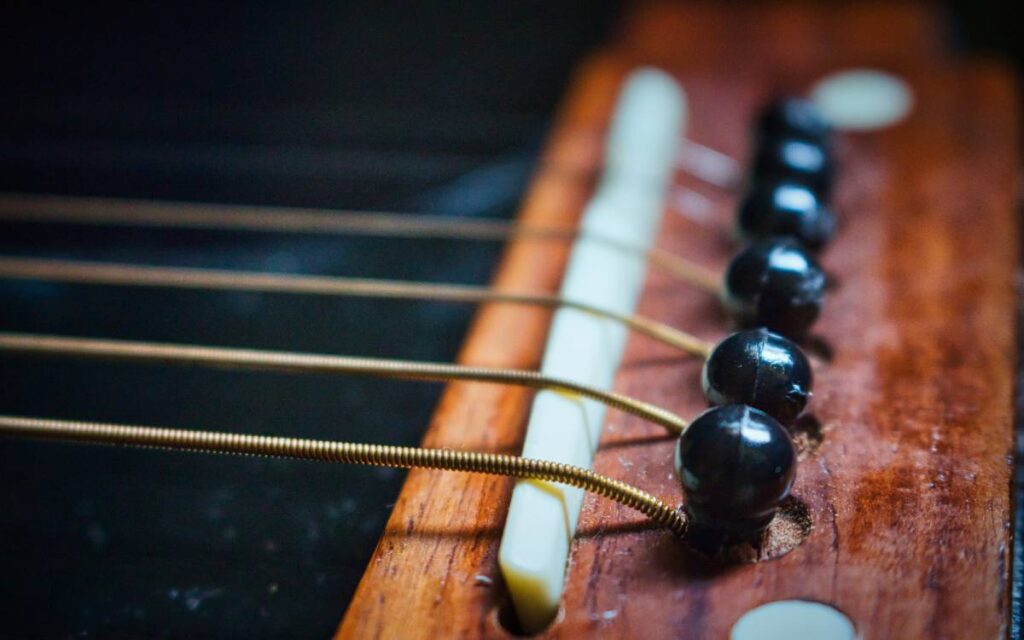
Phosphor bronze guitar strings (sometimes called pb strings) are made for acoustic guitars with steel strings. They were first released in 1974 by John D’Addario, and D’Addario phosphor bronze strings are still classic examples.
Phosphor bronze strings start with a steel core wire (sometimes with a hex core), then are wrapped with wrap wire composed of 92 percent copper, 8 percent tin, and trace amounts of phosphorus. They are the most popular acoustic strings out there, and feature enhanced corrosion resistance compared to other types of steel strings.
Over time, the oils from your fingertips stick to the strings and cause them to corrode, which gives them an almost rusty feel. This can cause guitar strings to deteriorate and lose their feeling and vibrations. The alloy used to wrap phosphor bronze strings helps mitigate this problem, which means you may not have to change strings as often, even with frequent guitar playing.
Phosphor bronze has a more “natural,” “bassier”, “darker”, or warmer tone that many prefer, especially when combined with a guitar built with brighter-sounding tonewoods like spruce.
What Are 80/20 Guitar Strings?
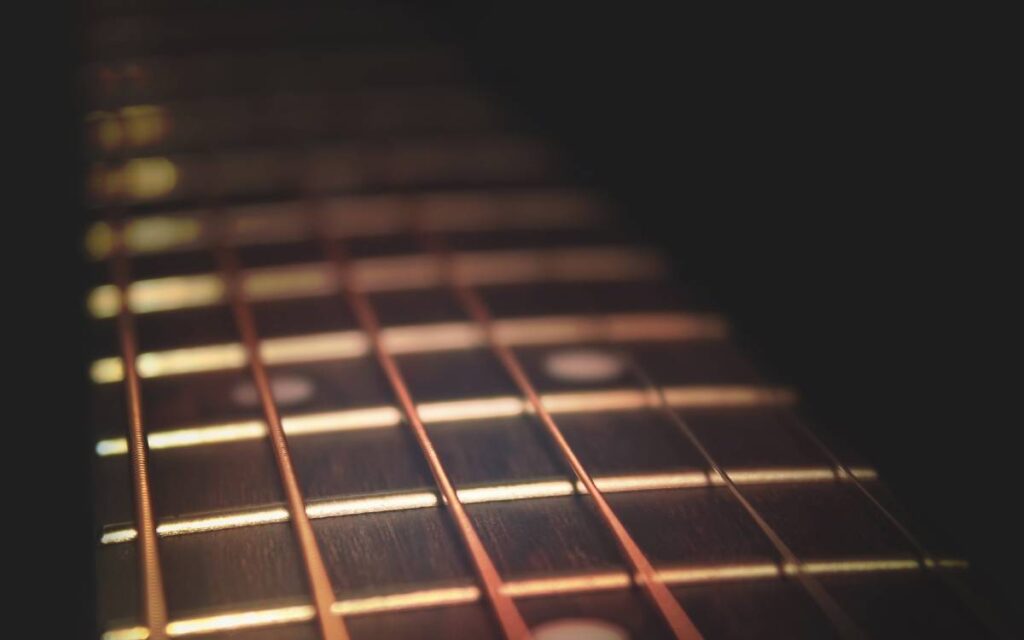
80/20 acoustic guitar strings have been around a lot longer, and were actually the first steel strings released for the acoustic guitar. Acoustic guitars were originally stringed with nylon strings, but in the 1930s steel stringed guitars with 80/20 bronze strings started gaining popularity.
The popularity of 80/20 bronze continued to grow until the 1960s and 70s, with many folk and classic rock musicians stringing their axes with them. However, 80/20 strings have a bright tone and punchy sound that many modern players do not favor compared to pb strings. But if you’re looking for bright bronze strings, these are the ones to go for.
80/20 strings contain a steel core wire wrapped with an alloy of 80 percent copper and 20 percent zinc. With the lower amount of copper vs phosphor bronze, 80/20 strings are much brighter to the ear, and the zinc alloy can also interact with the sweat and oils from your hand to cause corrosion.
There is nothing wrong with using 80/20 strings, especially if you want the vibrant sound that comes with them. You can increase the bass response by using a thicker string gauge, and you can also buy coated strings or use a good string condition to help prevent corrosion vs plain strings.
The Difference Between Phosphor Bronze and 80/20 Strings
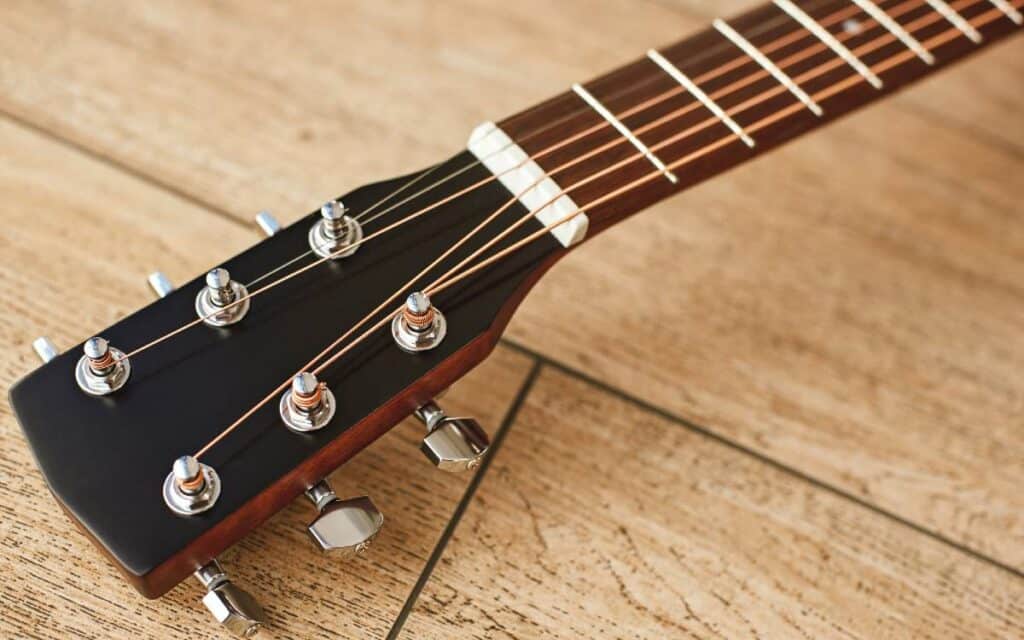
The main differences between phosphor bronze vs 80/20 bronze guitar string types starts with the two alloys. This causes a difference in sound, feel, and corrosion resistance.
However, when picking the best guitar strings for you, it helps to keep in mind that your specific guitar makes a big difference. Certain tone woods, like mahogany, are naturally darker than brighter tone woods, like spruce.
Throwing a set of phosphor bronze strings on a mahogany guitar might make it sound a bit too dark for your taste, whereas some good 80/20 strings might balance it out. But you might also be going for that dark, bassy tone that mahogany paired with phosphor bronze produces. The same goes for putting 80/20 strings on a spruce guitar – it might be a bit too bright, whereas phosphor bronze might have a balancing effect due to the darker string tone.
The same thing goes for guitar size. Smaller instruments tend to sound brighter, so phosphor bronze could be a great choice to balance out the sound, whereas they might make your huge dreadnought sound too dark. Stringing your parlor guitar with 80/20 strings might be too bright, whereas your old jumbo could be perfectly enhanced by 80/20 strings.
It’s all about the tone you’re going for, and the guitar you have, when deciding between phosphor bronze vs 80/20. It’s definitely a good idea to play around with different strings on different guitars to see which sound and feel you like best for your playing style. You may find that, to your ears, one set of strings may suit a different style or guitar than the others.
Phosphor Bronze
- Made with 92 percent copper
- Lasts longer (3-6 months)
- Corrosion-resistant
- Work great for smaller guitars
- Natural, well-balanced sound, warmer sound
- Widely used in music from the 1970s until present
- Low maintenance
80/20 Bronze
- Made with 80 percent copper
- Last for less time (4-6 weeks)
- Not corrosion-resistant
- Works better for large guitars
- Bright, punchy sound
- Widely used from the 1930s until the 1970s
- Uncoated versions may need string conditioner
Why Phosphor Bronze Guitar Strings and Who Uses Them?
Why are phosphor bronze strings so popular? There are several reasons why they are the top guitar strings used today:
- You do not have to restring your guitar as frequently
- They resist corrosion, even with humidity, sweat, oil, or frequent playing
- They have a great playing feel, no matter if they are coated or uncoated
- They produce a mellower, warmer, more natural sound that is more common in modern music
We want to make it clear that much of this is personal preference, and also can be genre dependent. Since phosphor bronze has a midrange response with more bass, certain types of artists favor the sound.
More modern, relaxed musical genres, such as folk, fingerstyle, alternative, and even modern country sound great with the tone that phosphor bronze strings produce.
Performers and professionals may also choose these strings to reduce string changes. It takes time to break in a set of acoustic strings, and choosing a string that resists corrosion can help reduce string change frequency.
Why 80/20 Acoustic Guitar Strings and Who Uses Them?
While phosphor bronze tends to be the most popular today, 80/20 strings have a following as well. Here are some of the things that some guitar players prefer about 80/20 bronze:
- More vibrant presence with an expressive, crisp, and brighter tone
- Sounds great with old time country, bluegrass, and rock ‘n’ roll
- They only take a few hours of playing to break them in
- Can help balance out “darker” sounding instruments
- Coated strings like Elixirs can mitigate the issues with corrosion
80/20 strings pair particularly well with larger instruments like dreadnoughts, because they help balance out the sound a bit and help make the bass less muddy to our ears.
Since these strings were originally used to record classic genres like folk, 60’s rock, old time country and bluegrass, these strings are excellent paired with these musical styles. The bright tone is what we expect to hear when listening to these tunes.
And with the invention of coated guitar strings, 80/20 bronze is coming back a bit, since the coatings help prevent corrosion and allow you to stretch your string changes out from a couple weeks to a few months before you need new strings.
FAQ
What types of guitar strings are there?

There are several different kinds of strings found in guitars. Here are some of the most common:
Acoustic:
Nylon strings. These are used on nylon string guitars for playing styles of music like classical, flamenco, folk, jazz, fingerstyle, etc.
Steel strings. There are several varieties of steel strings, all of which contain a steel core with the bass strings wrapped in different alloys. The differences are enough to hear.
Phosphor bronze. The most common type of string. These strings create a mellow, balanced, “modern” sound that has come to define acoustic guitar sounds since the 1970s. Great for a variety of genres, and plays well with smaller body instruments.
80/20 bronze. The second most popular, these produce that classic, punchy, bright sound found in older folk, country, bluegrass, and more. Perfect for dreadnoughts.
Brass wound. Brass is known to produce a very bright sound, much brighter than 80/20. Brass strings are less common.
Silk and steel. Another niche type of string, Silk and Steels are composed of a wrap wire over a core of silk and steel music wire.
Electric. Like with acoustic strings, these begin with steel as the base wire then are wrapped in different metals to get various tonal qualities:
Steel wound
Nickel wound
That’s a brief overview of the main types of guitar strings out there, although there are other less-used string styles out there, such as D’Addario’s nickel bronze strings.
What is the construction of guitar strings?
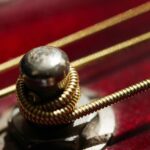
Guitar strings have several different components in them that help produce their unique sound and playing characteristics. They are:
Steel string music wire core. This can be hex core or round
Wrap wire. Metal alloys wrapped around the core to produce different sounds
There are three varieties of winding type: half-round, flat-wound, and round-wound
Coated or uncoated. Coatings help the string last longer, but some guitarists don’t like the slick feel
How does string gauge affect guitar strings?
All guitar strings come in different gauges. Heavier gauges have greater string tension, emphasize the bass sounds of the guitar, and may be more challenging to play. Whereas light gauge strings emphasize the treble sounds, and may be easier to play (although they are prone to more fret buzz).
The specific gauges vary by manufacturer, but usually are composed of extra light, light, custom light, light/medium, medium, and heavy.
What are the best guitar string brands of 80/20 and phosphor bronze?
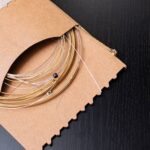
There are many different guitar string manufacturers out there. Here are some of the top makers of 80/20 and phosphor bronze acoustic guitar strings:
D’Addario. The D’Addario company is one of the oldest string makers out there, and originated phosphor bronze. Their strings are still a staple in many guitar cases.
Martin. They don’t just make guitars – they make killer strings, too.
Elixir. These are the most well-known coated strings on the market, and are favorites of many.
Ernie Ball. Ernie Ball makes a wide variety of acoustic and electric strings in many different materials.
GHS. Makers of excellent strings – both guitar and bass strings, as well as other instruments.
Santa Cruz. Originators of innovative strings that are “tension based” rather than based on gauges.
How much do acoustic guitar strings cost?
This depends on brand, style, and whether it’s coated or not. 80/20 can be as cheap as $4-$5 for uncoated varieties, and as expensive as $18-$20 for coated strings.
Phosphor bronze is slightly more expensive, at around $7-$9 for uncoated, and $20-$25 for coated, depending on brand.
Which Strings Should You Choose?
There is a simple solution for those who enjoy many different types of guitar strings. Our best advice is to have a guitar with a set of phosphor bronze, and another guitar with 80/20. Then, when you want to hear a particular sound when you play, you can grab that guitar.
Plus, who doesn’t want an excuse to get more guitars? 😛

